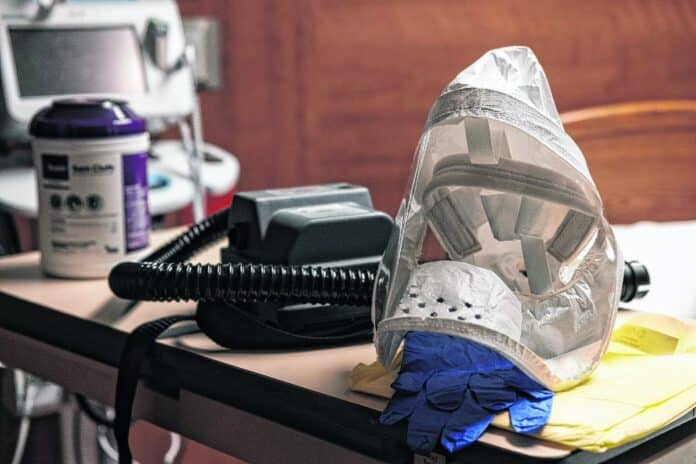
Bartholomew County residents joined the rest of the Hoosier state with a sense of unease as the first case of coronavirus, known as COVID-19, was reported in Marion County on Friday.
There have been no suspected or confirmed cases of COVID-19 in Bartholomew County, as of Friday.
Dr. Brian Niedbalski, Bartholomew County health officer and physician at Columbus Regional Health, said “people shouldn’t panic here, but we need to be aware that it is something that might be occurring in our community.”
An outbreak of a new type of coronavirus has been reported in more than 90 countries and continues to edge into more U.S. states, including the one case in Indiana.
[sc:text-divider text-divider-title=”Story continues below gallery” ]Click here to purchase photos from this gallery
The virus has infected at least 100,000 people globally and at least 3,400 patients with the illness have died, including at least 14 in the United States, The Associated Press reported.
On Friday, Gov. Eric Holcomb declared a public health emergency in Indiana after a patient at Community Hospital North in Indianapolis tested positive for the virus after traveling from Boston.
The man had a cough and low-grade fever and did not need to remain hospitalized, said State Health Commissioner Kris Box. Health officials are reviewing the man’s travel and who else he had been in contact with since returning to Indianapolis on Wednesday.
Last week, officials in Bartholomew County formed a “COVID-19 coalition” to ensure a coordinated response to any potential local outbreak. The coalition, which includes representatives from Columbus Regional Health, the city of Columbus mayor’s office, Bartholomew County Health Department, Bartholomew County Emergency Management, Bartholomew Consolidated School Corporation and Cummins Inc., held its first meeting on Feb. 28 and plans to meet this Friday, local health officials said.
Niedbalski spoke with The Republic about COVID-19, who is at risk of developing serious illness and the likelihood of an outbreak in Bartholomew County.
Q: What is COVID-19?
A: COVID-19 is a novel coronavirus. There have been coronaviruses around for years. Years back, there was SARS (Severe Acute Respiratory Syndrome), which was an example of a coronavirus that started in China as well.
Q: How does COVID-19 spread?
A: It’s generally spread through respiratory droplets, so coughing, sneezing. Then that gets into another person’s mouth or nose, typically. It’s thought that maybe it may enter into the eyes as well, so that’s why it’s being recommended that if you’re in close contact with a patient with COVID-19, that you wear protective eye wear.
Q: What are the symptoms of COVID-19?
A: The main symptoms are fever, cough, shortness of breath. You can get other symptoms. The other symptoms that have been reported are congestion, like a runny nose kind of like with a cold, sore throat and even diarrhea.
Q: What is the incubation period for COVID-19?
A: You can develop symptoms anywhere between two and 14 days. If you traveled to another country and it has been two weeks and you have no symptoms, the belief is that you’re not going to develop any illness.
Q: Who is most at risk of developing severe illness from COVID-19?
A: Generally, what we’re seeing as far as people getting the sickest are the elderly and people who have underlying health conditions like heart disease, (chronic obstructive pulmonary disease), diabetes. A little bit of the problem is a lot of people … in the common population, if you get (COVID-19), the thought is it may just be like a common cold. You wouldn’t even know. It’s just that people that get it who are older are much more susceptible to getting the serious symptoms.
Q: When should someone seek medical attention?
A: If you have symptoms such as that, the first thing you should probably be thinking is just a common cold or maybe influenza, which is much more common. If you have a concern, you should be contacting your primary care physician’s office to get more insight into that.
Q: How is COVID-19 treated?
A: Right now, there’s just symptomatic care. If you are at home and you have a fever, cough, you’re treating that with medications like Tylenol, ibuprofen or cough suppressants. A concern, as with any illness, is if you start to have severe symptoms, you’re having trouble breathing or severe cough or a high fever, then that should be the time that you’re seeking medical attention.
Q: What is the mortality rate of COVID-19?
A: It’s in the 2 to 3% range. I don’t think that’s changed. What we are believing is that there are even more people, likely in China, that had COVID-19 and didn’t even realize that they had it because their cases were so mild. So that mortality rate may be even lower. (The mortality rate for the seasonal flu is 0.1%, according to the National Institute of Allergy and Infectious Diseases).
Q: How is testing for COVID-19 done?
A: If we have a patient that we’re concerned about, we’re to contact the (Indiana State Department of Health) right away and they would run us through the proper channels on how to obtain the sample and how to send it in. The state can do some preliminary testing, but that is, in turn, sent off to the (federal Centers for Disease Control) for definitive testing.
Q: The Indiana State Department of Health has announced that a case of COVID-19 has been detected in Marion County. Does this change the overall approach to prevention in Bartholomew County?
A: I think people just need to be aware that there is a case in Indiana and that there is a good possibility that we could see it locally and we just have to be prepared for that. That’s what we’re trying to accomplish with the coalition that we’ve formed. We assumed that Indiana would see some cases but it’s difficult to predict where or when. What everyone needs to be aware of is that this is a virus that is something like the flu. We just have to use those precautionary measures — hand washing, avoid touching your face if you haven’t washed your hands. I want to stress to people that if they feel that they are at risk for COVID-19 for any reason, they should be contacting their physician for guidance.
Q: Bartholomew County has several international companies with operations in China, Japan and other countries that have seen the bulk of the COVID-19 cases around the world. To what extent are Bartholomew County residents at risk of being exposed to COVID-19?
A: One of the things that we’ve been discussing in our COVID-19 coalition are ways that we can contact larger companies here locally and how they should be responding.
Q: What should employers, schools and healthcare facilities in Bartholomew County be doing to prevent the spread of COVID-19?
A: That’s the real reason that we started the coalition. There are still a lot of questions out there. There are still a lot of unknowns. There are things that are constantly changing with the illness itself. The main thing is just making sure everyone is educated on what it is. I think there’s a little bit of, to some degree, an overreaction to the illness right now. Now, we definitely need to be prepared. …Make sure that if you’re sick, especially if you have a fever, you shouldn’t be going to work or school. Parents shouldn’t be sending their kids to school if they have a fever. That goes for anything, especially the flu, which is very prevalent in Bartholomew County. The same things you would do for influenza. We’re still talking with companies on what their decision-making is going to be if someone is sick and how long they’re to be kept off of work.
Q: What is the likelihood of someone in Bartholomew County being diagnosed with COVID-19 without traveling internationally?
A: It’s very hard to say. I think we’re definitely seeing cases out west where there’s some community spread, which means they do not know how they got it. It’s likely they’ve been in contact with someone who has been in contact with someone (who had COVID-19) and spread it that way and the person likely did not have very significant symptoms. It could just seem like a common cold to most people. Most of those deaths have occurred in a nursing home (in Washington state), so you have an elderly population in very close quarters and a lot of those (people) probably have underlying health problems as well, so they’re very susceptible. So one of the things that we’re trying to do locally is to send out education to some of the extended care facilities so they would be able to see those signs and symptoms at an early stage.
Q: According to the federal Centers for Disease Control, there have been at least 32 million cases of the flu, resulting in 310,000 hospitalizations and 18,000 deaths in the United States so far this flu season. How hard has Bartholomew County been hit by the flu?
A: We have seen a lot of flu cases this year, definitely. Just to kind of put things in perspective, we see a new illness, we see coronavirus and everyone is rightfully concerned, but the flu is killing many more people in the United States, in Indiana, every year. To me, that’s the thing we need to be most concerned about. …It’s about prevention, making sure that everyone is washing their hands frequently when they’re out in public, not exposing people when their sick, not out going out to church or school or work when you’re sick. Just common-sense things, not putting your hands in your mouth or on your face unless they’ve been washed. Every year we’re really aggressive about convincing people to get their flu vaccines. Now, there’s no vaccine for coronavirus, but there is a vaccine for influenza. That is something that we can try to prevent or make the symptoms less severe if you get your flu vaccine.
Q: Has the tough flu season created some extra anxiety in the public about COVID-19?
A: I don’t think so. If you go from year to year, there’s always some waxing and waning as far as how many flu cases we see locally. Maybe if this was on the heels of bird flu or swine flu, people would have a little bit more concern. But I think (COVID-19) is just something new that people are seeing in the news, it’s something new and people are dying from it, so that’s what really has grabbed people’s concern.
Q: Overall, is the flu more dangerous than COVID-19?
A: I just think that (people) are more likely to get the flu. Both illnesses can be serious if you’re in that (susceptible) population.
Q: Should people in Bartholomew County be worried about COVID-19?
A: I don’t think they should be worried. We’re not here to cause any unreal panic. I think it’s just becoming prepared and knowing how to prevent it, and we’re trying to educate people. …The people we are most concerned about — beyond people who have been in contact with COVID-19, which in (in Bartholomew County), is extremely, extremely unlikely — are people who have traveled abroad to (places) like China, Japan, Iran, Italy and South Korea.
[sc:pullout-title pullout-title=”Donations for care packages” ][sc:pullout-text-begin]
The Ninth Street Park Neighborhood Watch has teamed up with the Salvation Army to launch Project Proactive Not Reactive.
The project is a community-wide effort to collect donations of supplies for care packages for individuals in Columbus undergoing treatment or quarantine for cases of influenza or suspected or confirmed cases of COVID-19 in the future, should they arise locally, said Christopher Rutan, neighborhood watch coordinator.
Individuals who are diagnosed with a respiratory illness like influenza or COVID-19 and need a care package should ask their medical provider to contact the Salvation Army to arrange delivery, said Amy Tompkins, title at the Salvation Army.
Rhutan said around five to 10 members of the Ninth Street Park Neighborhood Watch have volunteered to deliver the care packages.
Supplies requested for donations include Kleenex, hand sanitizer, toilet paper, gloves, masks, Clorox wipes, Lysol and water/Gatorade, according to a news release. Rhutan said donations can be made to the Salvation Army and donors should specify the donation is for Project Proactive Not Reactive.
The neighborhood watch plans to follow guidelines set by the federal Centers for Disease Control and Prevention and the World Health Organization when delivering the supplies to prevent community spread, Rhutan said.
The Ninth Street Park Neighborhood Watch will discuss the effort at its meeting Monday at 6 p.m. in the Red Room at the Bartholomew County Public Library, 536 Fifth St. The meeting is open to the public.
[sc:pullout-text-end][sc:pullout-title pullout-title=”Local website” ][sc:pullout-text-begin]
The Indiana State Department of Health is including more information, including a list of frequently-asked questions, at https://on.in.gov/COVID19.
Locally, Columbus and Bartholomew County officials are creating a site on the Bartholomew County website where information will be shared about coronavirus. The Bartholomew County website is bartholomew.in.gov. A link to that site will be placed on the city’s website at columbus.in.gov.
The information is expected to on the county website by Monday, officials said.
[sc:pullout-text-end][sc:pullout-title pullout-title=”How the virus is spread” ][sc:pullout-text-begin]
Human coronaviruses are most commonly spread from an infected person to others through:
- Respiratory droplets released into the air by coughing and sneezing
- Close personal contact, such as touching or shaking hands
- Touching an object or surface with the virus on it, then touching your mouth, nose or eyes before washing your hands
- Or, rarely, through fecal contamination
— Source Indiana State Department of Health
[sc:pullout-text-end][sc:pullout-title pullout-title=”How to protect yourself” ][sc:pullout-text-begin]
The best way to protect yourself from any respiratory illness, including the flu, is to:
- Wash your hands often with soap and water for at least 20 seconds. If soap and water is not available, use an alcohol-based sanitizer.
- Avoid toughing your eyes, nose or mouth with unwashed hands.
- Avoid close contact with people who are sick.
- Stay home if you are sick
- Cover your cough or sneeze with a tissue, then throw the tissue in the trash.
- Clean and disinfect frequently-touched objects and surfaces
Face masks
The Centers for Disease Control does not recommend people who are well wear a face mask to protect themselves from respiratory illnesses, including coronavirus. You should only wear a mask if a health care professional recommends it. A face mask should be used by people who have the virus and are showing symptoms to protect others from the risk of infection.
Source: Indiana State Department of Health
[sc:pullout-text-end]




